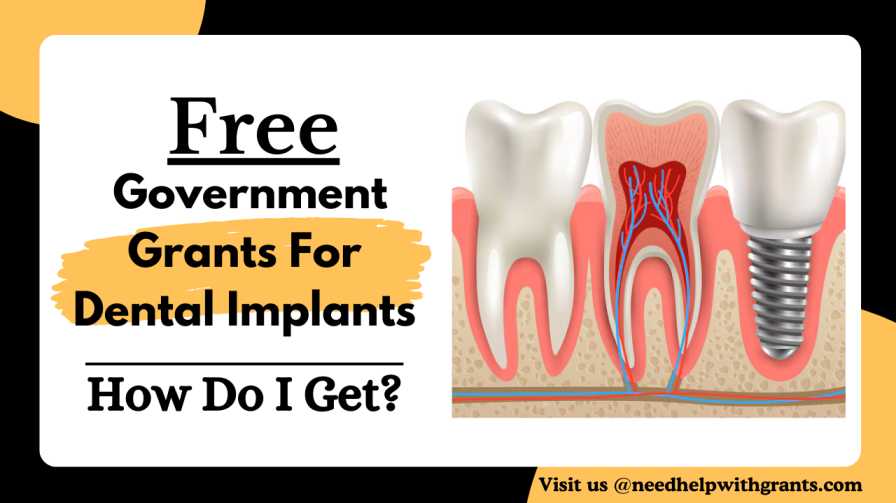Do you want a whiter smile but don’t dare spend money on dental implants? Out of curiosity, how do I get government grants for dental implants? Here you will find a wealth of information about Medicaid, dental schools, and philanthropic organizations that are willing to help you achieve that confident smile. You will have the opportunity to learn details about the eligibility requirements and application processes for obtaining government grants for dental implants for low-income individuals.
Key points:
- Government grants may cover a portion or all of the costs associated with dental implants, including surgery, materials, and follow-up care.
- Directly contact the Government programs and associations for more details and info.
- People who are searching for dental implants may also explore other options such as dental schools, charitable organizations, or dental discount plans.
- Applicants typically need to demonstrate their inability to afford dental implants through documentation of income and medical necessity.
Finding free government grants for dental implants can be a challenge, but there are several avenues you can explore. Here is a complete guide to help you navigate the process:
How Do I Get Free Government Grants For Dental Implants?
Here I have described some researched processes to get free government grants for dental implants. Follow these processes to get guaranteed dent implant grants.
- Research Programs: Look into federal, state, and local programs that offer financial assistance for dental care. Agencies such as Health and Human Services, the Veterans Administration, and the Indian Health Service may have relevant programs.
- Community Health Centers: Federally qualified health centers (FQHCs) often provide dental services at reduced or even free costs.
- Nonprofits: Organizations like Dental Lifeline Network offer grants to people with disabilities, seniors, and people with low incomes.
Read More: Government Grants For Heating And Air Conditioning
Best Government Grants for Dental Implants Near Me
Finding government grants for dental implants is a crucial issue if you are in urgent need of dental implants. If you search for government grants for dental implants near me, you will get a list.
1. Medicaid
For low-income people, Medicaid is a lifeline for dental treatment, including funding for dental implant operations. Eligible patients can get some of their implant surgery costs reimbursed by Medicaid, although it will not cover everything.
Medicaid does a vital job of helping people afford dental surgery, even if it is not as extensive as other government grants for dental implants. To determine which government grants best suit their circumstances, patients can speak with their licensed dentists.
Eligibility for Medicaid:
- Accessible to low-income families and individuals who meet certain income requirements.
- States have different eligibility standards.
- There may be additional requirements for some populations, such as pregnant women, children, and people with disabilities.
- Applicant eligibility is based on citizenship or legal immigration status to the United States.
- There are limits on income and assets, which change depending on the composition of the household.
2. Dental Schools
Free dental implants are available through dental school grant programs that focus on cosmetic dentistry and other oral health activities. Training students allows these programs to offer low- or no-cost services to patients.
Expert dentists oversee all dental treatments, from routine check-ups to more advanced operations such as implants, to ensure the highest level of care. Patients should ask about any hidden fees, such as the cost of implants, even if their evaluations and treatments might be free.
Eligibility for Dental Schools
- Most institutions have strict requirements that applicants must meet, such as proof of financial need or other special requirements.
- Many dental procedures, including dental implants, may be covered by grants.
- To be eligible for these awards, patients must apply and meet certain criteria.
- Students receive high-quality dental treatment under the supervision of licensed dentists.
3. Veterans Dental Care Grants
Offering free comprehensive treatments to veterans, the elderly, the disabled, and the medically fragile, the Dental Lifeline Network is a great resource for veterans seeking financing for dental care. Dental Lifeline Network can provide funding for the dental care needs of veterans thanks to donations from organizations like the ADA Foundation.
Veterans who cannot afford necessary dental care due to financial limitations will receive the care they need and deserve thanks to these awards. If you are looking for government assistance for dental implants for veterans, you should visit the official Dental Lifeline Network website at https://dentallifeline.org/ for more information.
Eligibility for Veterans Dental Care Grants
- Available to veterans who meet certain requirements, such as those with disabilities caused by their service or who have financial needs.
- Depending on individual circumstances, grants can fund a variety of dental procedures, including implants.
- Certain grant programs or funding sources may have different eligibility restrictions.
- Applicants may be required to prove military service or a disability.
- Veterans without alternative means of obtaining sufficient dental treatment are the typical recipients of these grants.
4. VA Dental Insurance Program (VADIP)
Veterans may be eligible to receive dental care through the Department of Veterans Affairs (VA). The VA Dental Insurance Program (VADIP) offers reduced-cost dental insurance coverage to veterans, and in some cases, dental implants may be covered if they are necessary for the veteran’s health.
Eligibility for the VA Dental Insurance Program (VADIP)
- Veterans enrolled in the VA healthcare system qualify for VADIP.
- Enrollment in the VA health care system means that the veteran receives health care services through the Department of Veterans Affairs.
- CHAMPVA is a program for spouses, widows, and children of eligible veterans.
- Certain family members of veterans may be eligible for VADIP. This includes dependents who are enrolled in the Civilian Health and Medical Program of the VA (CHAMPVA).
5. Medicare Advantage Plans
While traditional Medicare does not cover dental implants, some Medicare Advantage (Part C) plans offer additional dental benefits that may include coverage for implants. It is essential to review the details of each plan to determine the extent of dental coverage.
Eligibility for Medicare Advantage plans:
- You must be 65 years or older.
- Some people under age 65 with certain disabilities or conditions, such as end-stage renal disease (ESRD), may also qualify.
- You must live in the service area of the Medicare Advantage Plan you want to join. Plans are usually regional and have specific service areas.
- You must already be enrolled in both Medicare Part A and Part B.
6. Dentistry From Heart
Dentistry From the Heart is known for its wide range of government-funded dental operations. Provides financial support to dental implant patients as a 501(c)(3) nonprofit organization, recognizing the financial and oral health barriers people face. Dentistry From the Heart helps low-income Americans pay for dental insurance and benefits, including fully funded dental implants.
In Florida, Dentistry From the Heart administers programs and plans that help Americans nationwide. Florida hosts many oral health events, but citizens of other states can also benefit at little or no cost. Visit the organization’s website to register for funding for cosmetic dental procedures.
Eligibility for Heart Dentistry
- People who need dental implants and other dental procedures can take advantage of this opportunity.
- There is a possibility that grants will pay for all costs related to the surgery.
- Eligibility requirements may change depending on the particular grant program.
- A person’s geographic location may have an impact on their eligibility for particular programs or activities.
- Online registration for grant programs is available on the organization’s website for those who are interested.
7. Children’s Health Insurance Program (CHIP)
CHIP provides health coverage to eligible children, including dental care. In some states, this may include coverage for dental implants if deemed medically necessary. This can be a valuable resource for families with children who need implants.
Eligibility for Children’s Health Insurance Program (CHIP):
- Children must be under 19 years of age.
- The child must be a U.S. citizen or meet certain immigration requirements.
- The child must reside in the state where she is applying for CHIP.
- CHIP is designed for families with incomes too high to qualify for Medicaid but who still meet the program’s income guidelines. Income limits vary by state and are typically set as a percentage of the federal poverty level (FPL).
- Some states may have additional eligibility criteria, such as age groups or family size considerations.
8. The Patterson Foundation
The Patterson Foundation is a charity that provides financial assistance to those in need of dental care, with an emphasis on cosmetic dentistry. A notable feature of their cosmetic dentistry grant program is the ease with which applicants of any age can complete the application.
The Patterson Foundation makes sure everything is easy to use and accessible through a two-step application process. The charity tackles oral health issues with expert volunteers. Members of the organization choose the award recipients every six months.
After selecting people, volunteers interview them and analyze their situations. The application procedure is simple and successful applicants can obtain grants quickly. Accepted candidates receive award funding within 30 days of selection, providing much-needed financial assistance for dental operations.
Eligibility for Patterson Foundation:
- For those who need help paying for cosmetic dental operations, we are here.
- The goal of dental treatment grants is to remove financial barriers to care.
- People of all ages can easily complete the app because of how intuitive it is.
- An examination of the applicant’s oral health requirements and an interview are the two parts of the assessment procedure.
- The members of the organization choose the beneficiaries every six months.
- Grant funds are typically disbursed to successful applicants within 30 days of their selection.
9. United Way
Free dental implant financing is one of the many community services offered by the renowned charity United Way. Those who are unable to apply in person can still access the process through their extensive network of offices across the country. Even those with busy schedules can apply for dental implant incentives and cosmetic dentistry rewards through the official website.
Beneficiaries get a better dental care experience as the company covers more than just implants; They also cover procedures such as dental crowns.
Eligibility for United Way:
- Accessible for patients undergoing dental implants and associated procedures.
- Donations could cover all costs of dental treatment.
- Some grant programs have more stringent requirements than others, and those requirements could include things like financial need.
- To apply for a grant, interested parties can consult the organization’s website for qualification conditions.
- Participation in some activities or programs may be conditioned on a person’s geographic location.
10. Samuel Harris Fund for Single Mothers
One of the Samuel D. Harris Fund’s most important charitable efforts is the provision of dental care to low-income families and individuals who are sole breadwinners. It does not provide free dental implant treatment, but it does give money to groups that provide advice on how to keep teeth and gums healthy.
Dental clinics, hospitals, and schools help provide necessary dental care and reduce the costs of dental implants. Dental implant grants pay up to $5,000 and the charity has awarded $94,379 in fees across 20 awards. Regular donations from kind people help the charity provide dental care.
Eligibility for the Samuel Harris Fund for Single Mothers
- Specialized in dental treatment for parents, caregivers, and single mothers.
- Grants for dental implants are typically capped at $5,000.
- Dental schools, clinics, and hospitals partner to treat beneficiaries.
- Grant allocation depends on individual needs and income.
- Other philanthropic organizations can support the fund’s initiatives.
Read Also: How to Get a Free Car From the Government
Eligibility Criteria for Getting a Grant For Dental Implants
Well, you have to get governments or non-profit organizations and institutions that provide funding for dental implants to have eligibility requirements. Here are some general requirements.
- People with modest incomes who need dental implant surgeries are the main beneficiaries of these grants.
- To prove they are qualified for the award, applicants typically must submit certain documentation.
- Like federal grants for dental implants, the application procedure is usually simple.
- Complete documentation may be required to support the application, including proof of residency and income.
- Dental implant therapy is available through these funds, but only for those who meet specific health requirements.
- When making hiring decisions, some companies give more weight to applicants with certain demographic or health issues.
- To improve their grant application prospects, candidates should carefully examine the qualification requirements specified by each organization and provide all necessary documentation.
Documents to Get Government Grants For Dental Implants
There are some eligibility requirements such as submitting important documents to obtain government grants for dental implants.
Proof of income and residency
You can use items like recent tax returns, pay stubs, or energy bills to prove that you are a low-income resident and validate your residency.
Health records
Dental implant therapy is only available to those who meet certain health requirements. Candidates may be asked to submit a medical evaluation or medical documents to verify their suitability for the operation.
The application document
Application forms are usually available online or in person at the offices of organizations that provide grants for dental implants. Applicants must complete them in their entirety.
Detailed documentation
Additional documentation regarding the applicant’s health and financial situation may be requested in addition to the application form. Documents such as medical reports and letters from healthcare providers may fall into this category.
Proof of citizenship or immigration status
Anyone seeking a government grant will need to provide proof of citizenship or authorized immigration status. Common examples of such documents are copies of passports, birth certificates, or immigration documents.
Additional documentation
The granting organization may require additional documentation, such as evidence of disability or hardship letters describing the applicant’s situation.
Evaluation completed by a dentist
To review the applicant’s dental health and establish his or her suitability for dental implant therapy, an oral examination may be performed by a qualified dentist after submission of the application.
Follow-up with the Granting Organization
Once the application has been reviewed, the next step is for the applicant to contact the awarding organization to clarify anything that is unclear or requires further information.
Read Also: Churches That Help With Rent Assistance Programs
How To Apply For A Dental Implant Grant?
If you want to get a grant for dental implants and are looking for where to find government grants for dental implants and want a detailed view of the application process, you must follow a particular process to be eligible for any dental grant.
Research and implementation
To find suitable organizations that offer dental grants, extensive research is necessary. Complete the application form available on the organization’s website and explain in detail why you need help with a dental operation.
Sending documents
To strengthen your application, collect and submit relevant documentation. Items the organization needs may include medical records, evidence of address, evidence of income, and anything else they deem necessary.
Evaluation by a panel of judges
A team of judges will review your cosmetic dentistry award application and decide if you qualify. Factors such as your health and financial situation will be considered during the evaluation of your case.
Dental checkup
To find out if you qualify, you must consult a local qualified dentist who will examine your teeth and gums. If you want to know if you qualify for the award, this assessment can help you.
Expert help provided by
After the checkup, you will continue working with the same dentist while you complete the rest of the grant application process. To expedite the review process, they will send your oral health exam to the organization.
Conclusion and proposal
We will conduct a second evaluation of your application, including all supporting materials and test results. Dental implant and cosmetic dentistry grant programs will provide you with funding for dental implants if they determine that you are better qualified than others.
Medical procedure
Your dentist or dental school can schedule an appointment for your procedure or treatment after you have received approval. To have dental implants, you can apply for a grant that will cover everything.
Bottom Line
To obtain government grants for dental implants, you need to study hard, apply carefully, and make sure you meet all the requirements. People can get important help in achieving a whiter, healthier smile by looking into options such as Medicaid, dental schools, and charitable groups.
Frequently Asked Questions (FAQs)
Can anyone apply for government grants for dental implants?
Yes, these government grants for dental implants are typically available for low-income people who have special dental needs.
Can I apply for multiple dental implant grants simultaneously?
Applying for many awards increases your chances of obtaining financing for dental implants. The financing entity must personalize each request.
What happens if my dental implant grant application is rejected?
You can reapply after rectifying any errors or providing the documents requested by the funding agency. Other options include seeking funds from other sources or using affordable dental clinics.



